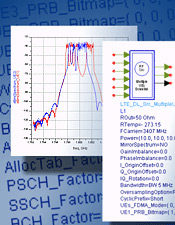Agilent Technologies Announces Extended Simulation Coverage, UL Receiver Capability for its 3GPP LTE Wireless Library

Agilent Technologies Inc. (NYSE: A) today announced a major update to the Agilent 3GPP LTE Wireless Library for use with the company's Advanced Design System (ADS) EDA software. New uplink receiver models and improved uplink/downlink source models help wireless-systems designers and verification engineers speed development of the evolving 3GPP Long Term Evolution (LTE) designs for next-generation mobile communications products. Agilent's 3GPP LTE Wireless Library is based on Release 8 of the 3GPP standard for the next generation of mobile communication products. It works within the ADS environment using the Agilent Ptolemy simulator to streamline the design and verification process. The library provides preconfigured simulation setups with signal sources for downlink and uplink, along with transmitter analyses such as spectrum, complementary cumulative distribution function (CCDF) and waveform measurements. The new uplink receiver models facilitate error vector magnitude (EVM) and bit error rate (BER) measurements for UL simulations. Additionally, the library's uplink and downlink source models have been improved to conform to TS36.211 v1.1.1 (2007-05) of the 3GPP standard. "Agilent is firmly committed to evolving the 3GPP LTE Wireless Library to keep pace with the developing 3GPP LTE standard," said Frank Ditore, system architecture product manager with Agilent's EEsof EDA division. "This is demonstrated by our extending simulation coverage further into the physical layer chain and adding UL receiver capability. As a result, designers can now verify the algorithmic performance of their IP against known reference models and validate BER performance of early 3GPP LTE designs." Agilent has also recently updated the Mobile WiMAX(tm) Wireless Library. Updates include MIMO support and inclusion of Convolution Turbo Coding (CTC)/decoding and system measurements with the CTC codec. Agilent's Mobile WiMAX Wireless Library conforms to the IEEE 802.16e-2005 standard.
